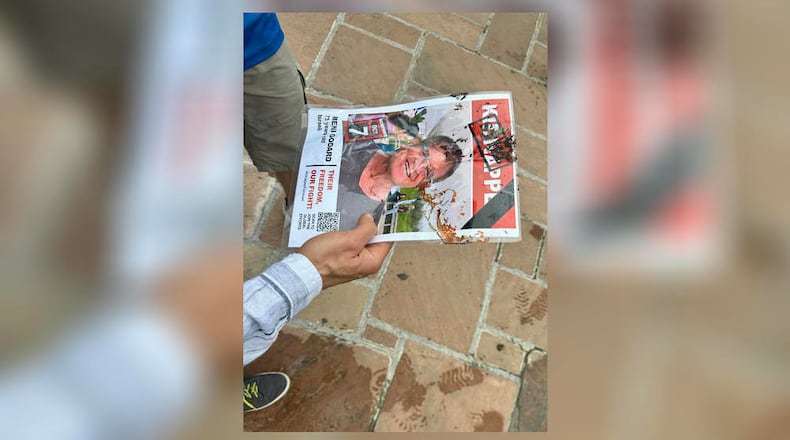The suspect, identified later by the FBI as 45-year-old Mohamed Sabry Soliman, assaulted the crowd with a makeshift flamethrower and other incendiary devices while yelling antisemitic slurs and threats, Horwitz recounted Monday.
The burst of violence took place during a Run for Their Lives event, part of a global initiative which calls for the immediate release of hostages held by Hamas.
“The demonstrators passed right in front of us, then five or 10 minutes later, a woman ran up saying there was someone throwing fire at people,” Horwitz, a current resident of Colorado, recalled. “... I immediately hopped over the patio gate and ran to the scene.”
As Horwitz approached, he began filming the suspect, who can be seen in the video pacing back and forth, while holding what looks to be two containers of flammable liquid with makeshift fuses, also known as Molotov cocktails.
The suspect can be heard shouting at the crowd, “We have to end Zionists,” and “Palestine is free.”
The video shows one bystander, who Horwitz said was not part of the demonstration, trying to talk Soliman down, to which the suspect responded, “They are killers!” while gesturing at demonstrators.
Horwitz said he began bringing water from a nearby fountain to dump on the legs of several victims who were burned, some severely.
“Their skin was hanging off their bodies,” he said, recalling burns and cuts that spanned in some cases from victims’ ankles to the tops of their thighs.
“Some had cuts about an inch in diameter, bleeding down their legs, just walking around with charred clothes on,” he continued. “People were groaning in pain, in total shock, and nearly all of them were elderly.”
Sunday’s attack came just over a week after two Israeli Embassy staffers were shot and killed in D.C. by a man who shouted “Free Palestine” as he was arrested.
Horwitz, who is Jewish, grew up in the Northmont area and later graduated from Miami University in Oxford.
Effects from the Israel-Hamas war have seemingly rippled to all corners of the globe, something Horwitz sees as “multi-faceted.”
“On one hand, I think the Jewish community is coming together as much as it ever has, identifying with one another and becoming stronger, but on the other hand, it’s terrifying,” he said. “Yesterday was the most terrifying thing I’ve ever been part of, but it’s also the whole landscape of everything and the prospect of what could happen next.”
Horwitz said that the recent escalation of violence against Jewish communities is underlined by an effort to mask antisemitism as anti-Zionism, something he sees as a symptom of an even larger issue, particularly in the U.S.
“Due to our polarized domestic politics and policies, there’s this ‘us versus them’ idea where there’s no gray area,” Horwitz suggested. “And I think it’s only going to get worse unless our representatives or government do something about it.”
Horwitz said that a lack of understanding of Zionism has likely contributed to harmful misrepresentations of Jews, especially as it relates to the war in Gaza.
“People have redefined Zionism to fit a narrative, but Zionism is simply the belief in Jews having a homeland of their own, self-determination, and safety from things like the Holocaust. It’s not a land free of Palestinians or Muslims or anything like that,” he said.
“The vast majority of Jews out there are not anti-Palestinian; they’re anti-Hamas.”
About the Author

